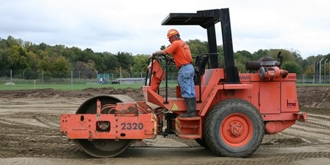Inexpensive Lancaster Excavation - Top Quality Excavation at Competitive Costs
Inexpensive Lancaster Excavation - Top Quality Excavation at Competitive Costs
Blog Article
Comprehensive Excavation Methods: Understanding the Basics for Success
The careful preparation, accurate implementation, and meticulous interest to detail called for in excavation jobs require a comprehensive strategy that includes numerous fundamental elements. The true mastery exists not just in understanding these basics yet in seamlessly integrating them to browse the complexities of excavation jobs with finesse.
Understanding Excavation Job Planning

Successful excavation tasks are built on the foundation of meticulous and thorough planning. The preliminary stage of any kind of excavation task is the drawing board, where essential decisions are made that can substantially influence the outcome of the job. Throughout this stage, it is necessary to gather all pertinent info about the site, consisting of topographical studies, dirt make-up, and any possible risks that may exist. Comprehending the project range, timeline, and spending plan restraints is vital for creating a detailed excavation strategy that ensures the task's success.
One key aspect of excavation task preparation is the growth of a comprehensive timeline that details the sequence of activities, due dates, and milestones. This timeline works as a roadmap for the task team, allowing them to track progression and make required modifications to make sure the project remains on timetable. Additionally, a distinct budget that accounts for all costs, consisting of equipment service, labor expenses, and materials, is necessary for preventing cost overruns and hold-ups. By very carefully taking into consideration all these factors during the planning stage, excavation projects can be implemented effectively and properly, causing effective results.
Dirt Analysis and Site Analysis
Carrying out thorough dirt evaluation and site assessment is an essential step in the prep work stage of any kind of excavation task. Soil analysis entails establishing the composition, structure, and properties of the soil at the excavation website. This information is important for comprehending the soil's bearing ability, wetness web content, and potential for disintegration, which are crucial consider determining the excavation methods and devices required for the task.
Website analysis surpasses dirt analysis and encompasses a wider assessment of the overall site conditions. This examination consists of identifying any type of prospective hazards, such as below ground utilities, ecological concerns, or unpredictable terrain, that can impact the excavation procedure. By extensively reviewing the website, project supervisors can establish reliable excavation techniques that focus on safety, efficiency, and environmental security.
Making use of sophisticated innovations like ground-penetrating radar, dirt sampling, and drone studies can boost the accuracy and efficiency of dirt evaluation and site assessment. Spending time and sources in these initial steps can ultimately conserve time and protect against costly hold-ups or difficulties during the excavation process.
Tools Choice and Utilization
Efficient excavation projects rely greatly on critical devices choice and use to make sure optimum performance and performance. Selecting the ideal tools for the job is important in taking full advantage of performance and decreasing downtime. Factors such as the kind of soil, depth of excavation, and project extent play a substantial function in establishing the most ideal devices for the job see here handy.

In enhancement to picking the suitable equipment, appropriate usage is vital to job success. Operators needs to be educated to take care of the equipment securely and effectively - excavating ohio. Routine maintenance checks and prompt repair services help stop failures and make sure consistent performance throughout the job
Security Measures and Rules Compliance
In the world of excavation projects, prioritizing security procedures and compliance with regulations is vital to making sure a safe and secure and legally audio functional setting. Security procedures encompass a series of methods, including performing complete site evaluations, applying proper signs and obstacles, and supplying ample safety training for all employees involved in the excavation process. Adherence to regulations, such as OSHA demands in the United States, guarantees that the excavation job meets the necessary standards to protect employees, onlookers, and the surrounding environment.

Tracking Progress and Adjusting Methods
Just how can project managers effectively track the advancement of excavation projects and adapt their techniques as necessary to enhance end results? Surveillance progress is crucial for making sure that excavation jobs remain on track and satisfy due dates. Project supervisors can utilize numerous devices and strategies to track progression, such as everyday development records, routine website assessments, and advanced surveillance technologies like drones and GPS tracking systems. By continually keeping an eye on the task's development, supervisors can identify any type of possible delays or problems early and take proactive measures to address them.

Final Thought
To conclude, grasping the principles of detailed excavation techniques is important for the success of any job. By recognizing job preparation, examining soil and website problems, selecting appropriate devices, adhering to safety policies, and monitoring progression, project managers can make certain a smooth and efficient excavation process. Applying these strategies will bring about effective outcomes and minimize prospective threats or troubles during the excavation job.
The first phase of any type of excavation task is the planning stage, where essential decisions are made that can substantially affect the outcome of the project. Recognizing the job timeline, spending plan, and scope restrictions is critical for developing a thorough excavation strategy that guarantees the project's success.
Exactly how can project supervisors successfully track the innovation of excavation projects and adapt their approaches appropriately to enhance results? By very closely keeping an eye on development and being prepared to adapt approaches, task supervisors can enhance the total success of excavation jobs.
By understanding project planning, evaluating soil and website conditions, picking ideal devices, abiding with safety and security policies, and checking progression, task managers can make certain a smooth go to this web-site and reliable excavation process.
Report this page